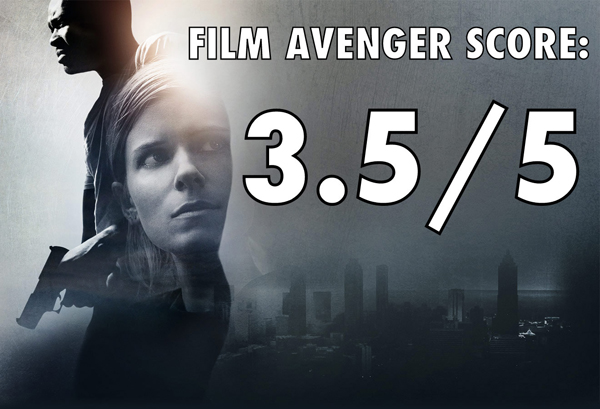Review| Captive: A Real Christian Story
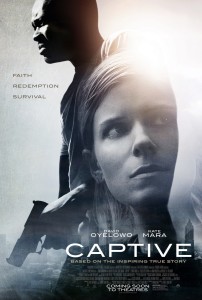 Captive is a good movie. Not great, but good. While not groundbreaking cinematically, it is a step in the right direction for movies with a faith-based message. And for that, its importance cannot be stated enough.
Captive is a good movie. Not great, but good. While not groundbreaking cinematically, it is a step in the right direction for movies with a faith-based message. And for that, its importance cannot be stated enough.The Good
Writer Brian Bird delivers a very tight, well-paced script. The story is told in a smooth, succinct way. The character arcs are strong, and there is little time wasted. It’s a rather bad reflection on today’s film industry when I’m astonished that a script merely delivers what it sets up. So many films don’t even accomplish that, or they do so halfheartedly.
 The real gems of this film are the performances of the two leads – David Oyelowo and Kate Mara. These two have a solid chemistry and play off each other well. Both Mara and Oyelowo play broken individuals, and one can tell that there’s a lot going on behind their eyes. There is a close-quarter awkwardness that feels organic in the situation. It’s a believable sense that neither one wants to be in the position they’re in, even though choices they have made have lead them down this road.
The real gems of this film are the performances of the two leads – David Oyelowo and Kate Mara. These two have a solid chemistry and play off each other well. Both Mara and Oyelowo play broken individuals, and one can tell that there’s a lot going on behind their eyes. There is a close-quarter awkwardness that feels organic in the situation. It’s a believable sense that neither one wants to be in the position they’re in, even though choices they have made have lead them down this road.
Oyelowo is especially superb. It’s extremely difficult for an actor to exude both threat and vulnerability. Oyelowo’s Brian Nichols is not a one-dimensional monster, but a mixed-up guy for whom we eventually feel sorry, which is the whole idea.
Thrillers like this only work when tension is maintained throughout the story, and director Jerry Jameson delivers. I was pleasantly surprised by Jameson’s prowess with modern camera techniques and angles, given that he has been directing television shows since the 1970s. He has a very good grasp of what works to continue tension in a scene.
The Not-So-Good
 Though I applaud Jameson for using modern filmmaking tricks, there is one he used way too much: the shaky-cam. This is a problem with many modern filmmakers, which is why I was again surprised that someone as seasoned as Jameson would overuse it.
Though I applaud Jameson for using modern filmmaking tricks, there is one he used way too much: the shaky-cam. This is a problem with many modern filmmakers, which is why I was again surprised that someone as seasoned as Jameson would overuse it.
Shaky-cam can be used to enhance the tension of a scene, but it needs to be subtle. And quiet character moments do not require it! There were times when I had to look away from the screen because it was just shook to the point of making me dizzy. We get it. The situation is harrowing. If I could see the situation, I might feel the same.
As tight as the script was, I would have preferred more character moments between Ashley, Brian and the book. This was supposed to be the turning point of the story and it was relegated to a minute-long montage of Ashley reading to Brian. I would have liked to have seen more response from Brian, wrestling with what the book said.
In his review of the film, screenwriter and author Brian Godawa summed up why Captive is something of a game-changer in faith-based film: “This is not an easy-answers story, and the Gospel is not bellowed in your face. It’s not a ‘Christian Movie.’ It points toward forgiveness and redemption in Christ without explaining everything. It’s not preachy, it’s complex and sometimes ambiguous, you know, like real life. But it doesn’t worship Rick Warren, either. It tells the true story as it happened.”
In other words, the faith theme inherent to the story itself is so well understood that it doesn’t need to be spelled out and spoon-fed to the audience.
What films like Fireproof, War Room and Courageous have in common, aside from marginal-to-terrible acting and writing, is a lack of risk-taking with content. The Kendrick Brothers, for all their success, do not really attempt to advance their message beyond being “comfort food” for those that already believe. In their view of Christianity, everyone comes to faith at the end of the story and the sinner’s prayer is said by at least one of the characters.
If they truly want to reach a wider audience, which I hope is their intent, their stories must be relatable and express a real portrayal of Christianity.
Brian Godawa links to an interesting article by John Mark N. Reynolds in his review, which suggests that the type of theology that films like War Room propagate is not just wrong, but dangerous. Reynolds makes the assertion that those films worship what he calls “Genie Jesus” – a superficial, juvenile version of Christ who is there, not to make us holy, but to grant our wishes whenever we pray for something. This is not in line with what Scripture actually teaches, that prayer is first and foremost a supplication to God’s will.
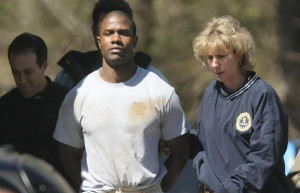 Captive works as a real, relatable faith story because it is complicated, just like reality. Both Ashley Smith and Brian Nichols are extremely flawed people with problems that are only beginning to be solved by the end of the film. Not everyone hears the altar call and there isn’t an ending where, for example, Brian Nichols goes free and sees his son because he showed mercy to Ashley Smith. There are real consequences, and he still goes to jail. We don’t even know if Brian is saved, but the film leaves us hoping that he will be. That’s great storytelling.
Captive works as a real, relatable faith story because it is complicated, just like reality. Both Ashley Smith and Brian Nichols are extremely flawed people with problems that are only beginning to be solved by the end of the film. Not everyone hears the altar call and there isn’t an ending where, for example, Brian Nichols goes free and sees his son because he showed mercy to Ashley Smith. There are real consequences, and he still goes to jail. We don’t even know if Brian is saved, but the film leaves us hoping that he will be. That’s great storytelling.
Captive also works because the filmmakers are interested in telling a good story first and letting the themes of faith flow from it naturally. In an interview, Terry Botwick, one of the producers of Captive, explained exactly what needs to happen in “Christian” film when he said, “I think we need to tell stories that everybody identifies with, and that happen to have organic, core elements of faith.”
I do not doubt the Kendrick Brothers’ sincerity or intent with their movies. However, they are thinking of the message before the story that connects the audience to that message, and the movie (and ultimately the message) suffer for it.
“‘For I know the plans I have for you,’ declares the Lord. ‘Plans to prosper you and not to harm you, plans to give you hope and a future.'” -Jeremiah 29:11
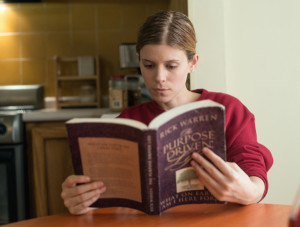 The book, The Purpose-Driven Life, is indeed the catalyst for the film’s turning point. However, it is not prominently positioned, with its cover always facing the screen or some other shameless form of product placement. It’s not about the book or Rick Warren. It’s about what the book says about the purpose of one’s life.
The book, The Purpose-Driven Life, is indeed the catalyst for the film’s turning point. However, it is not prominently positioned, with its cover always facing the screen or some other shameless form of product placement. It’s not about the book or Rick Warren. It’s about what the book says about the purpose of one’s life.
One of the things every human struggles with is purpose. It seems that people are constantly looking for the meaning of their lives. We can keep telling ourselves that we are just evolved primates, but no other species on this planet has the ability to question its own existence and purpose. We are special in that way.
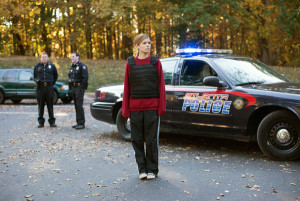 In Captive, Brian and Ashley were both looking for purpose. They are at the ends of their respective ropes, looking to other things to fill their life with purpose. One was falling faster and faster into a spiral of addiction; the other was committing senseless acts for revenge and self-satisfaction. By the end of the film, Ashley finds renewed purpose with her life, and we hope that Brian does the same.
In Captive, Brian and Ashley were both looking for purpose. They are at the ends of their respective ropes, looking to other things to fill their life with purpose. One was falling faster and faster into a spiral of addiction; the other was committing senseless acts for revenge and self-satisfaction. By the end of the film, Ashley finds renewed purpose with her life, and we hope that Brian does the same.
The Lord created each and every one of us for a reason. We all have a part to play in His great story. But we all need to realize that simple concept – that it is God’s story, not ours.
Conclusion
In the cinematic sense, Captive is not a groundbreaking film, but it is enjoyable. The clean, concise script and excellent acting by the two leads brings an astonishing amount of power and sincerity to the story.
The film is, however, groundbreaking in the sense that it is a stepping stone to more realistic and relatable movies about faith from mature Christian filmmakers. Captive has at its core a vision of Christianity that is complicated, but still gives hope and purpose to all who choose to take up their cross and follow Christ. Never forget that, no matter what you have done, you have been “fearfully and wonderfully made” by a God that loves you and has purpose for your life (Psalm 139:14). All you have to do is have faith that, through Jesus’ perfect sacrifice, He can save you from yourself. And in that freedom and supplication, we all can find purpose and our role in the Greatest Story Ever Told.




